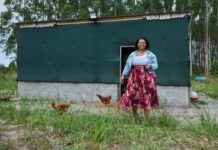Deciduous Fruit Value Chain Financing Project Farmer
Job creation in the agricultural sector could be boosted by Smallholder Farmer (SHF) support programmes that focus on, and are built around, the needs of the farmer beneficiaries, says the Jobs Fund.
“Through our experience in managing over 30 agriculture projects, the Jobs Fund has come to appreciate the complexity and technical requirements of these interventions”, says Najwah Allie-Edries, the Jobs Fund Head, “This has been further informed through a funding round which was devoted in its entirety to the support of agricultural initiatives aimed at developing smallholder and emerging farmers.”
“A one-size-fits-all approach won’t work, given that the SHF group is not homogenous. Different interventions need to be designed depending on the type of farming operation targeted (produce-type, production volumes, land available, etc.), the value chain in which the farming enterprise operates, the experience and expertise of the farmer(s), and the needs of the community in which the project is to be implemented,” urges Allie-Edries.
Good practice shows that the intervention design should be largely influenced by where in the development pathway the target farmer is situated, for example:
- Subsistence farmers: These Jobs Fund interventions were aimed at improving rural livelihoods and generally offer technical skills development to improve production and increase yields – this ensures better food security for the farmer and his/her family, income-generation through the selling of some of the produce in local community markets and in some cases through off-take agreements with organisations, and job creation (either within the family of the farmer or within the local community).
- Small-scale producers: These interventions were aimed at improving the farmer’s economies of scale and getting them to a point where they can secure regular offtake for their produce. In some instances, agro-processing facilities are developed to include the farmers in secondary production. The projects result in sustainable farming operations, job creation and supply of local markets.
- Emerging farmers: These are interventions for farmers who are potentially on the cusp of entering the small commercial space but require assistance to get there. This generally relates to securing affordable finance for expansion, integration into the specific value chain in which they operate, as well as meeting quality standards which open new local and export markets. These projects have the capacity to employ large numbers of people.
Allie-Edries further explains, “Land lease models have been shown to be effective when SHFs are starting out in their farming careers; they have access to land, but not the expertise and inputs to begin farming and cultivation. A commercial farming enterprise partners with these SHFs in order to bring the land into production. The SHF benefits through skills-transfer, an income for leasing the property to the commercial farming enterprise and also profit from earning a wage.”

These models are particularly helpful in capacitating first-time farmers with the knowledge and expertise required to graduate to running their own enterprises in the long term. They are also guaranteed an income while learning.
“Entrepreneurial models, on the other hand”, explains Allie-Edries, “are effective in supporting more experienced farmers, who already have some level of success, but require assistance to scale their operations to the point where they are able to compete commercially.”
Allie-Edries also explains the importance of suitable funding sources for SHFs, “The majority of funding products available in the market do not match the earning profile and income stream of the farmer. The lack of sufficient collateral is one of the key reasons why farmers are not able to secure funding. As a result, the Jobs Fund is introducing new models that ensure inclusion.”
One of these projects emerged out of an existing partnership; Hortgro’s Deciduous Fruit Development Chamber (DFDC) intervention, which intervenes in the deciduous value chain. More than 20 black smallholder deciduous fruit producers will graduate to commercial status over a 4-year period, through improving productivity at farm level, facilitating market access, assisting with quality standards and production inputs, and the provision of required machinery and equipment.
“Although the DFDC project has performed very well to date, one of the key learnings is that a farmer’s full integration into the value chain is dependent on access to finance to further expand. An accessible funding product was unavailable to these farmers and so the Jobs Fund Hortfin project was developed to bridge this gap”, Allie-Edries confirms.
This new project aims to scale the impact of the first project by establishing a new fund which will allow farmers to more readily scale their operations through access to further funding. The new project will involve:
- Reducing the cost of capital for emerging farmers
- A sustainable R600 million industry-specific funding mechanism has been established that will significantly contribute to industry transformation.
- By making available an innovative finance product, this partnership provides comprehensive assistance that may significantly contribute to the transformation of the industry over time.
- The creation of a sustainable fund
- The R200 million Jobs Fund grant will be used to reduce the weighted average cost of capital of the established fund, enabling the interest rate margin to cover its operational costs.
- Crowding in further partners (funding & expertise)
- The grant has crowded in additional funding from the Land Bank, who will also be responsible for managing the loan book.
- Participants in the broader fruit industry are expected to play an important role in identifying opportunities, forming joint ventures and generally providing support to the investee companies.
“Regardless of the project model, intervention that hold the most promise for the expansion of agriculture and the creation of jobs, are those which provide support at each milestone along the development path that a SHF will follow in his/her business or career: from taking a decision to become a farmer and/or the initial step of land acquisition; through the crucial first season when the foundation must be laid; to subsequent career or farming business growth; and his/her eventual exit from farming (succession planning)”, concludes Allie-Edries.








